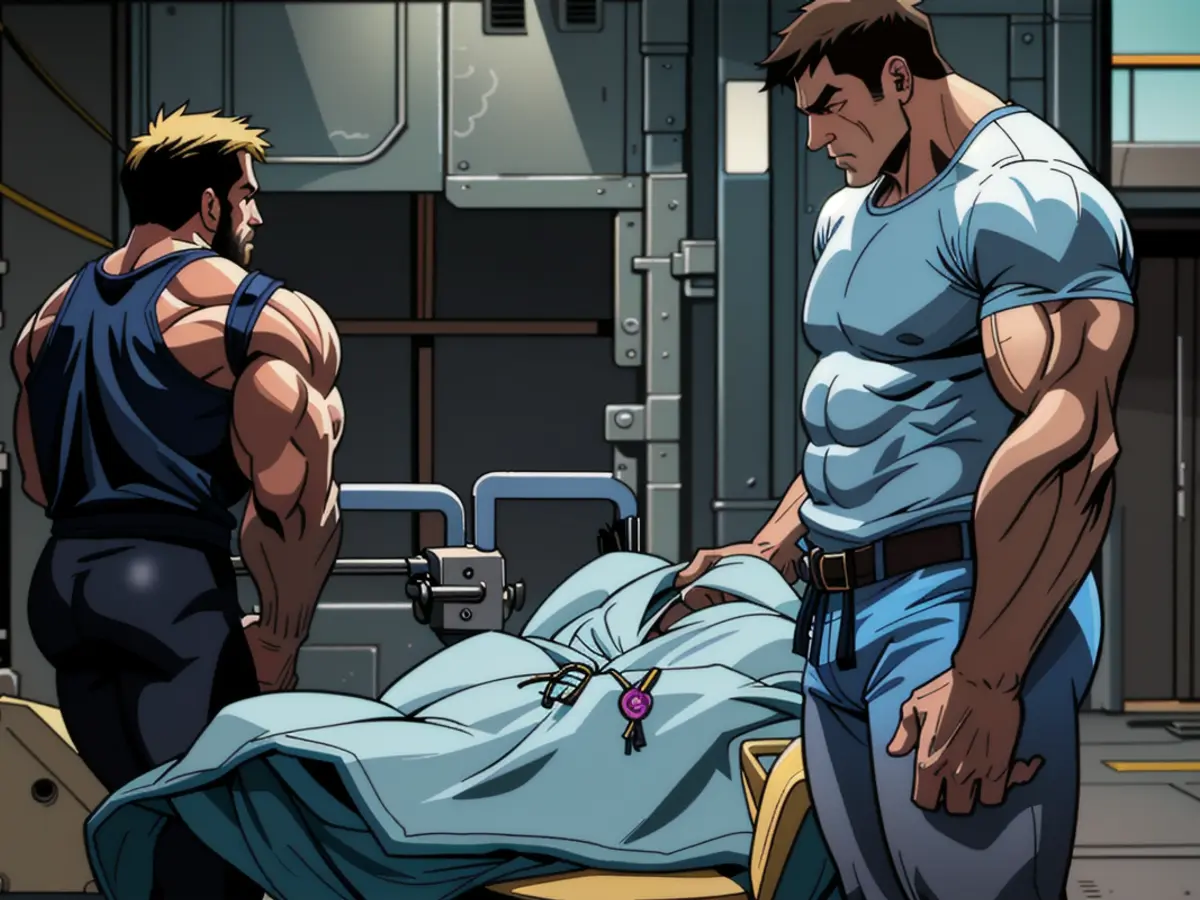A Chilling Portrayal: The Heart-Wrenching Scene in "Adolescence" That Captures the Entire Series' Essence
'Adolescence' series reaches its climax in this critical phase. - The series "Adolescence" reaches its climax in this phase.
By Sarah Stendel* ⏱️ - 3 Minutes
The hit Netflix series, "Adolescence", sends shivers down spines and stirs up conversations: This dark British miniseries about a thirteen-year-old boy who murders a girl is also gaining popularity in Germany on Netflix. The show dissects the path that led to this heinous act, examining the insidious online "manosphere," a corrupt realm of misogynistic influence on young men. The murderer, Jamie, expertly played by Owen Cooper, views himself as an "incel," a man who is involuntarily celibate and hates women due to this.
Besides stellar acting, it's the cinematic finesse that makes the series particularly gripping: Each episode is shot in a captivating, single, uncut camera take.
The third episode stands out, as the teenage killer Jamie encounters psychologist Briony Ariston (Erin Doherty) in prison. She's there to evaluate him, clarify his motivation, and determine if he understands the gravity of his actions. This episode transforms into a gripping chamber piece, with most action taking place around a table. The transformation from childlike yearning for recognition to chilling rage in Jamie's conversation with Briony is nothing short of masterful television.
"Adolescence": Highlighting Everyday Sexism's Chilling Impact
Then there's that seemingly inconsequential moment that encapsulates the series perfectly. Briony delves into Jamie's perception of men by asking about his first male role model, his father. What does he do? What's he like? Then she asks, "Does your father have female friends?" The bewilderment on Jamie's face when faced with the notion that women can be valued for more than their bodies that refuse sex is deafening. It's not just the dark, ideological "incel" underbelly of the web that shapes misogynistic patterns, but also everyday sexism. Children learn from their environment, often picking up on nuances that adults overlook. If a father doesn't associate with women, doesn't read books by women, or listen to music by women, if women only appear as servants or potential sexual objects, children absorb these messages.
Post the series' success, discussions about social media dangers, bullying, the absence of male role models, and parental responsibility are ongoing. These are crucial conversations. However, it's crucial to acknowledge that a phone ban won't suffice if the environment around harbors misogyny, even unintentionally. Jamie's father isn't portrayed as a buffoonish, macho stereotype. He adores his wife, plays football with his son on weekends, hangs out with friends at the pub, gets loud at times, then feels ashamed. It's precisely because everything seems normal, and there's no single, definitive explanation for the tragic act, that the series feels all too real.
"Adolescence" excels at highlighting subtle, everyday sexisms: in episode three, it's the disdainful prison warden who feels compelled to school Briony, a visibly competent professional, about body language. In the second episode, it's the teacher who neglects to introduce her female police colleague when the male officer is present. These small details may go unnoticed by many viewers. However, they provide the foundation for the ideologies that Jamie subscribes to. He dismisses evidence against him as "fake news" and presents himself as a sympathetic character to Briony because he didn't rape the victim. By the end of episode three, the psychologist is left in tears, choking back sobs, and the viewer is likely to feel a lump in their throat.
- Netflix
- "-Series"
- Incels
Additional Insights:The Netflix series, "Adolescence," delves into the complex and disturbing themes of misogyny and everyday sexism, underscoring the dangerous ways these ideologies can affect young minds.
- Toxic Masculinity and Incels: The show examines the harmful impact of online subcultures like incel culture, which fosters resentment towards women. Jamie, the protagonist, is influenced by such ideologies, leading him to commit a heinous crime against a female classmate. This illustrates how toxic masculinity can radicalize young men through social media and the "manosphere."
- Reference: [1][3]
- Everyday Sexism's Insidious Nature: The series demonstrates how everyday rejection and perceived injustices can be amplified and distorted by online narratives, leading to dangerous outcomes. Jamie's case serves as a reminder of how a culture that teaches men to view rejection as an affront can lead to violence.
- Reference: [1][3]
- Social Media's Influence: The series critiques the pervasive influence of social media in shaping societal attitudes, especially among adolescents. It exposes how algorithms and toxic online communities can foster a gender divide and fuel violence.
- Reference: [3]
- Educational Potential: Creators Jack Thorne and Stephen Graham aim for "Adolescence" to serve as an educational tool, sparking discussions about the dangers of toxic masculinity and its impact on society. Thorne hopes it will be shown in schools and parliaments to raise awareness.
- Reference: [1]
- Timeliness: The show's release coincides with increased concerns over gender violence and the radicalization of young men online, making it a timely commentary on contemporary societal issues.
- Reference: [1][3]
- Cinematic and Narrative Technique: The series uses a unique one-shot filming style, creating a real-time narrative that keeps viewers engaged and absorbed in the tragic events unfolding. This approach adds to the emotional and thematic impact of the story.
- Reference: [2][4]
[1] Dedman, A. (2022, January 21). Netflix drama 'Adolescence' explores the dark side of the internet. Yahoo Entertainment UK. https://uk.entertainment.yahoo.com/news/netflix-drama-adolescence-explores-dark-side-internet-171841638.html[2] Lumsden, J. (2022, January 19). Netflix’s one-take series Adolescence plots the path to a killer’s downfall. The Guardian. https://www.theguardian.com/tv-and-radio/tvandradioblog/2022/jan/19/netflixs-one-take-series-adolescence-plots-the-path-to-a-killers-downfall[3] Taylor, A. (2022, January 21). 'Adolescence' Review: A One-Take Series for the Social Media Age. The Hollywood Reporter. https://www.hollywoodreporter.com/review/adolescence-1235178937/[4] Wiener-Bronner, M. (2022, January 18). 'Adolescence' on Netflix Is a Triumph of One-Take Filmmaking. IndieWire. https://www.indiewire.com/2022/01/adolescence-realtime-one-take-series-netflix-1234751546/
- The riveting conversation surrounding the Netflix series, "Adolescence," disseminates to various international platforms, such as Germany, underscoring the show's strong global impact.
- The series' third episode, a gripping chamber piece, unveils the transformation of the protagonist Jamie, an incel influenced by the "manosphere," from childlike yearning to chilling rage.
- The showcased seemingly inconsequential moments in "Adolescence" serve to highlight the insidious nature of everyday sexism and its potential influence on impressionable minds, including young Jamie.









